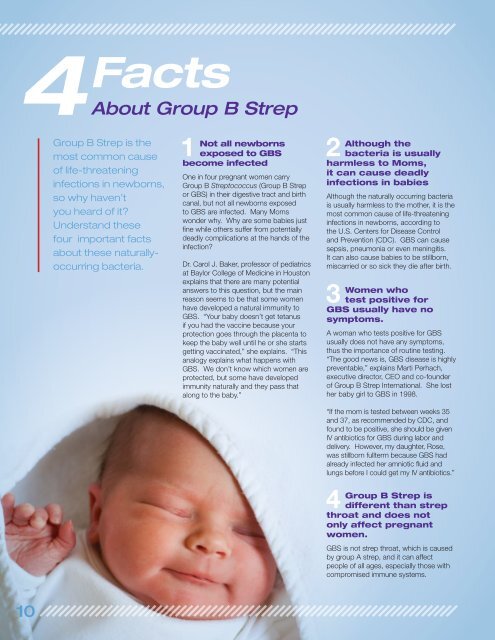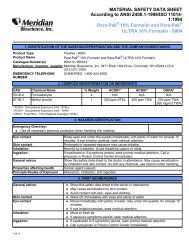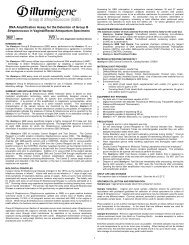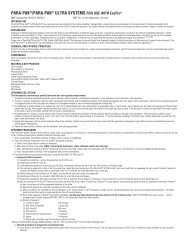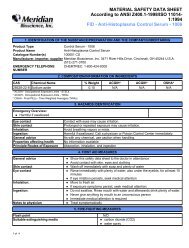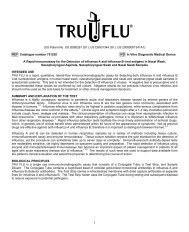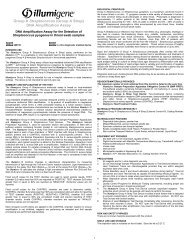GBS Answers - Meridian Bioscience, Inc.
GBS Answers - Meridian Bioscience, Inc.
GBS Answers - Meridian Bioscience, Inc.
You also want an ePaper? Increase the reach of your titles
YUMPU automatically turns print PDFs into web optimized ePapers that Google loves.
4 Facts<br />
About Group B Strep<br />
Group B Strep is the<br />
most common cause<br />
of life-threatening<br />
infections in newborns,<br />
so why haven’t<br />
you heard of it?<br />
Understand these<br />
four important facts<br />
about these naturallyoccurring<br />
bacteria.<br />
1<br />
Not all newborns<br />
exposed to <strong>GBS</strong><br />
become infected<br />
One in four pregnant women carry<br />
Group B Streptococcus (Group B Strep<br />
or <strong>GBS</strong>) in their digestive tract and birth<br />
canal, but not all newborns exposed<br />
to <strong>GBS</strong> are infected. Many Moms<br />
wonder why. Why are some babies just<br />
fine while others suffer from potentially<br />
deadly complications at the hands of the<br />
infection?<br />
Dr. Carol J. Baker, professor of pediatrics<br />
at Baylor College of Medicine in Houston<br />
explains that there are many potential<br />
answers to this question, but the main<br />
reason seems to be that some women<br />
have developed a natural immunity to<br />
<strong>GBS</strong>. “Your baby doesn’t get tetanus<br />
if you had the vaccine because your<br />
protection goes through the placenta to<br />
keep the baby well until he or she starts<br />
getting vaccinated,” she explains. “This<br />
analogy explains what happens with<br />
<strong>GBS</strong>. We don’t know which women are<br />
protected, but some have developed<br />
immunity naturally and they pass that<br />
along to the baby.”<br />
2<br />
Although the<br />
bacteria is usually<br />
harmless to Moms,<br />
it can cause deadly<br />
infections in babies<br />
Although the naturally occurring bacteria<br />
is usually harmless to the mother, it is the<br />
most common cause of life-threatening<br />
infections in newborns, according to<br />
the U.S. Centers for Disease Control<br />
and Prevention (CDC). <strong>GBS</strong> can cause<br />
sepsis, pneumonia or even meningitis.<br />
It can also cause babies to be stillborn,<br />
miscarried or so sick they die after birth.<br />
3<br />
Women who<br />
test positive for<br />
<strong>GBS</strong> usually have no<br />
symptoms.<br />
A woman who tests positive for <strong>GBS</strong><br />
usually does not have any symptoms,<br />
thus the importance of routine testing.<br />
“The good news is, <strong>GBS</strong> disease is highly<br />
preventable,” explains Marti Perhach,<br />
executive director, CEO and co-founder<br />
of Group B Strep International. She lost<br />
her baby girl to <strong>GBS</strong> in 1998.<br />
“If the mom is tested between weeks 35<br />
and 37, as recommended by CDC, and<br />
found to be positive, she should be given<br />
IV antibiotics for <strong>GBS</strong> during labor and<br />
delivery. However, my daughter, Rose,<br />
was stillborn fullterm because <strong>GBS</strong> had<br />
already infected her amniotic fluid and<br />
lungs before I could get my IV antibiotics.”<br />
4<br />
Group B Strep is<br />
different than strep<br />
throat and does not<br />
only affect pregnant<br />
women.<br />
<strong>GBS</strong> is not strep throat, which is caused<br />
by group A strep, and it can affect<br />
people of all ages, especially those with<br />
compromised immune systems.<br />
10


